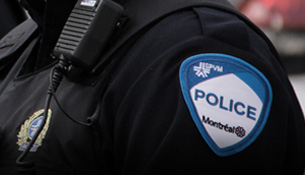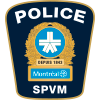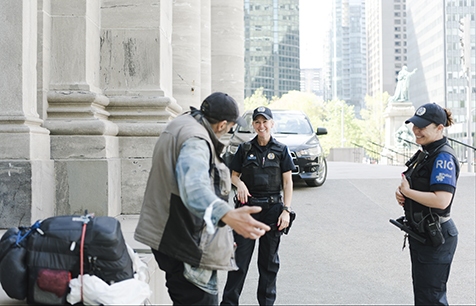
Équipe de concertation communautaire et de rapprochement (ECCR)
Since April 2021, the SPVM has deployed the Équipe de concertation communautaire et de rapprochement (ECCR in the downtown area, that of the North-East and of the West.
These zones are delimited according to common issues of urban security and social cohabitation.
Completely released from responding to emergency calls, the ECCR is responsible for going out and meeting citizens and community organizations with a view to finding sustainable joint solutions with them to current or emerging urban safety and social coexistence issues.
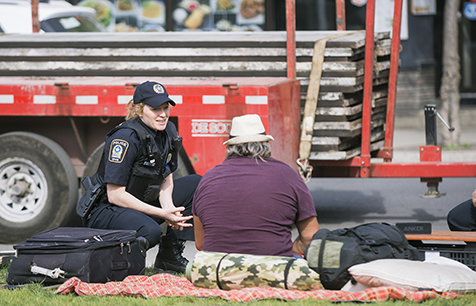
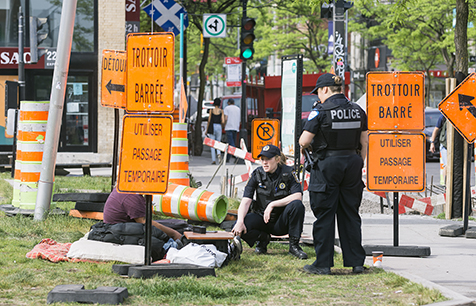
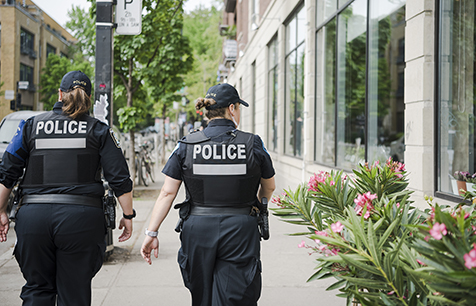
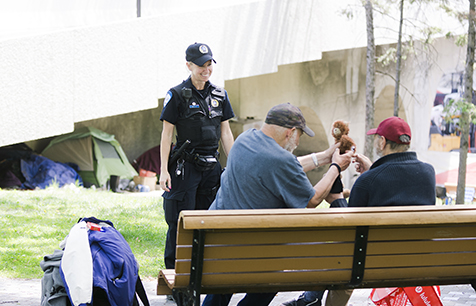
Interventions with people in vulnerable situations
A considerable percentage of calls received by the Service de police de la Ville de Montréal (SPVM) are linked to social problems. Each day, police officers work directly on the frontline with people in vulnerable situations, whether they are in crisis, for instance mentally disturbed, homeless or intoxicated.
Police interventions alone do not respond to all situations of vulnerability or unexpected occupation of public space in Montréal. In fact, no intervention, no player can alone claim that they provide a unique solution to all of the complex challenges that have an impact on urban safety and social cohesion in Montréal.
The power of partnerships
This is why the SPVM has developed various initiatives in recent years to promote improved consultation within the scope of the expertise, mandates and limits of the various players, mainly in the justice system, health and social services, and community environment.
These initiatives most often take the form of specialized mixed teams such as the ESUP (Équipe de soutien aux urgences psychosociales), the EMRII (Équipe mobile de référence et d’intervention en itinérance), deployed in partnership with the Centre-Sud-de-l’Île-de-Montréal, and the Patrouilles conjointes autochtones, carried out in collaboration with the Centre d'amitié autochtone de Montréal (CAAM).
These initiatives reduce the number of repeat interventions with the same people and lower tensions resulting from coexistence problems. Currently, the SPVM wishes to step up winning practices and help the community police adapt to an innovative consultation approach.
In the current context, the SPVM recognizes the importance of focusing on bridge-building with citizens and community organizations to continue to adapt its services to respond to the public’s new realities, current or emerging needs and priorities. Following the success achieved by many pilot projects and its specialized mixed teams, the SPVM is deploying the Équipe de concertation communautaire et de rapprochement (ECCR).
Community consultation stop-off points
Whilst conducting its safety mission, the ECCR builds bridges by identifying community consultation stop-off points, places conducive to exchanges in a neighbourhood. During foot patrols, police officers from the ECCR go out and meet citizens and workers from community organizations, wherever they are, including in shelters, parks, seniors’ residences, subway stations, or shopping centres.
Community consultation stop-off points favour police work based on citizens’ and skateholders’ upstream concerns, and not in response to calls. They encourage exchanges with citizens on emerging issues, resolution of concerns connected with criminal activity or with regard to people in vulnerable situations and with whom it is possible to intervene upstream.
These exchanges seek to find sustainable joint solutions to urban safety and social coexistence issues in the neighbourhood. In addition, the SPVM wants police officers and the various players to meet up in the field on a day-to-day basis to improve their practices together and become even more effective with the public. Secondly, police officers from the ECCR work in areas where needs for bridge-building are the most striking, in conjunction with the neighbourhood police stations and in coordination with local initiatives.
A team dedicated to citizens’ concerns
This new way of working in the community gets citizens involved in prioritizing police work and solving social problems closely linked to public safety. Patrol officers at the various community consultation stop-off points help police officers from the ECCR develop a better understanding of diverse ethnocultural communities and become familiar with the social fabric and better understand the realities experienced in the neighbourhoods.
The presence of officers from the ECCR in the field contributes to demystifying, raising public awareness of police work in terms of the duties and responsibilities of the police, opportunities and limits of police intervention.
Prevention and presence in public places
Police officers from the ECCR intervene with marginalized people in vulnerable situations (homeless people or people with drug addiction, sex workers, etc.), based on a helping relationship approach as part of the wide-ranging police mission.
The existence of the ECCR enables the SPVM to coordinate an adapted and long-term police intervention in coordination with action taken by neighbourhood police stations and involvement by various partners.
A mission focused on an innovative consultation approach
Consultation refers to the action in coming to an agreement relating to a joint project based on sharing powers and responsibilities towards establishing a potential partnership. This process is carried out by adopting an open-minded approach, engaging in dialogue and showing respect to the parties involved.
The ECCR’s mission involves encouraging proactive police work, by focusing on a synergetic partnership approach, based on citizens’ concerns, and creating opportunities for dialogue with a view to strengthening the bond of trust towards various communities and organizations. Responsibility is shared between all partners as part of joint commitment and with respect for everyone’s expertise, mandates and action.
Duties and responsibilities
In partnership with citizens, community organizations and neighbourhood police stations, police officers from the ECCR are required to:
- solve problems by finding joint solutions to urban safety and social coexistence issues, such as homelessness and poverty;
- contribute to reinforcing the social fabric and anticipating issues, whilst being attentive;
- step up preventative action at the source of urban safety issues, and accordingly improve the quality of life in the communities;
- develop a better understanding of diverse ethnocultural communities and become familiar with the social fabric to better understand the realities experienced in the neighbourhoods.
A decentralized team structure
This new permanent team is supervised by a commander. The team will have two working groups in each of the three areas, each respectively made up of a sergeant and six permanent police officers.
Deployment in three phases
|
Areas with shared issues |
|
Scheduled timeframe |
|
Downtown |
PDQ 12, 20, 21, 22, 23 and 38 |
Phase 1. Deployed |
|
North-East |
PDQ 27, 30, 31, 33, 39, 42 and 45 |
Phase 2. Deployed |
|
West |
PDQ 9 and 26 |
Phase 3. To be determined |
Each two-person team will experience the local realities in the areas served mainly via the foot patrol. Moreover, each neighbourhood police station concerned will host two permanent police officers from the ECCR at its premises. The two-person teams will start and end their shifts in their host unit and will report to their officer in an online meeting.
To find out more:
To find out more:
Division de la prévention et de la sécurité urbaine
Équipe de soutien aux urgences psychosociales - ESUP (english)
Équipe mobile de référence et d’intervention en itinérance - EMRII (english)
Module des incidents et des crimes haineux (english)
Section spécialisée en violence conjugale (English)
Patrouilles conjointes autochtones (English)
Other innovative practices at the SPVM
Brigade des espaces publics (french only)
E=MC2 au service des personnes en situation d’itinérance (english)
Équipe métro d’intervention communautaire - EMIC (french only)
Containment and de-escalation training (english)
Publications
Assistance resources
Domestic and intrafamily violence
Integrated Police Response for Abused Seniors - IPRAS (english)
Newcomers and Asylum Seekers
Non-Violence Squad
People who are mentally disturbed or in crisis situations
Process for reporting a crime in a conjugal violence context
IN THE MEDIA
« On essaye une approche différente ». La Presse, October 14 2021
Entrevue avec Laurent Gingras, sergent ECCR. TVA, Le Québec matin, October 14 2021
Le SPVM double son effectif de concertation communautaire au centre-ville et dans le nord-est. Journal Métro, October 14 2021
Montreal police announce community co-operation team. Montreal Gazette, October 14 2021
Montreal Police Announces Community Cooperation Team. Canadian News, October 14 2021
Montreal police creates new squad in the fight against rising gun crime. CTV News, October 14 2021
Montreal police develops community outreach team. CityNews Montréal, October 17 2021
Une équipe du SPVM pour aider les itinérants. TVA Nouvelles, October 21 2021
Sans-abri mort durant la nuit glaciale | « Un signal qu'on doit vraiment faire plus ». La Presse, January 12 2022
Note: In this article, we mention “Équipe de prévention sociale du SPVM”. In fact, the name of this team is “Équipe de concertation communautaire et de rapprochement”.
Des policiers qui patrouillent pour faire du bien . Radio-Canada, January 13 2022
SPVM's community cooperation program for those experiencing homelessness. CBC, Daybreak Montreal, 24 January 2022
Une matinée avec l’ECCR. Noovo, 26 January 2022

